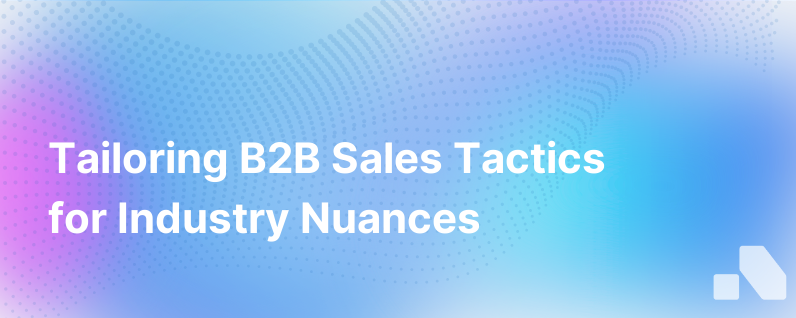
In today's hyper-competitive B2B landscape, it's more important than ever to ensure that your sales approach is meticulously tailored to fit the unique landscape and decision-making processes of each industry you target. Personalizing your B2B sales strategy isn't just a nice touch—it's a critical component for breaking through the noise, nurturing genuine connections, and closing more deals.
Each industry has its own set of unspoken rules, pain points, success measures, and, most importantly, customer expectations. How you sell a SaaS product to a tech startup will differ from how you approach a healthcare provider considering new medical equipment. This customization in your sales approach can be the difference between a closed deal and a lost cause.
The Pillars of Personalization in B2B Sales
Personalization in B2B sales hinges on a profound understanding of:
- The industry’s ecosystem and its regulatory landscape.
- The unique challenges each sector faces.
- The distinct buying cycles of each industry.
- The key decision-makers and their individual pain points.
- Successful customer stories and testimonials within similar contexts.
Understanding these pillars allows you to tailor your conversations, demonstrate empathy, and position your product as an essential solution to the industry-specific issues your prospects face.
Customizing Your Approach: Industry-Specific Strategies
1. Technology Sector
When selling to the technology sector, your sales approach must highlight innovation and ROI. Tech companies, whether startups or multinationals, are looking for solutions that can scale with their growth and give them a competitive edge. Your strategy should involve:
- A deep dive into the company's tech stack, ensuring your product can be seamlessly integrated.
- Use of data-driven insights to showcase potential efficiencies and ROI your product offers.
- Provision of case studies that demonstrate how you have scaled and innovated with similar tech companies.
2. Healthcare Industry
In healthcare sales, trust and compliance are paramount. Prospects in this sector are looking for solutions that will not only help them streamline operations but also maintain the highest levels of patient care and confidentiality. Tailoring your sales for this industry involves:
- An understanding of healthcare regulations like HIPAA and how your product adheres to such standards.
- Demonstrating patient care improvements or administrative efficiencies gained with the use of your product.
- Building long-term relationships and trust, providing evidence of reliability and support.
3. Manufacturing
The manufacturing industry is all about optimizing the supply chain and operations. When selling a B2B solution to manufacturing companies:
- Communicate how your product can minimize downtime or accelerate production times.
- Address inventory management, cost reduction, and real-time data visibility.
- Provide robust post-sale support and training assets to ensure smooth implementation.
4. Financial Services
Precision, security, and compliance guide the financial services industry:
- Discuss the security features of your product in detail.
- Use case studies to show how you’ve helped similar clients improve their bottom line while staying compliant with industry regulations.
- Highlight how your solution can help manage and mitigate risks.
5. Education
The education sector is often budget-conscious and results-oriented:
- Focus on the long-term educational outcomes and student success that your product facilitates.
- Be well-versed in educational standards and how your product meets or exceeds them.
- Tailor your pitch to show a deep understanding of the academic calendar and procurement cycle.
Implementing Personalization in Your B2B Sales Approach
-
Data-Driven Insights: Harness the power of CRM tools to analyze customer data. Knowing past purchase behavior, pain points, and industry trends can help tailor your pitch.
-
Content Customization: Develop industry-specific content that addresses common concerns. Blog posts, whitepapers, and case studies that speak to industry-specific issues can be very persuasive during the sales process.
-
Account-Based Marketing: ABM is the ultimate personalization strategy in B2B sales. It involves understanding the specific accounts' needs and crafting unique propositions to match.
-
Sales Enablement Tools: Invest in sales enablement platforms that allow your sales team to quickly access and present customized content based on the client's industry and needs.
-
Continuous Improvement: Personalization is an agile process. Solicit feedback from clients, refine your sales scripts, and stay up-to-date with industry shifts.
Harnessing Technology for Scalable Personalization
With the increasing need for personalized sales experiences, utilizing AI platforms like Aomni can be a game-changer. Aomni delivers actionable insights tailored to different verticals, making it possible to gather real-time research and competitive intelligence. Empowering your sales team with personalized sales content in minutes, Aomni enhances the ability to sell strategically without the overhead of traditional research methods.
In conclusion, personalizing your B2B sales approach by industry is vital. Embrace the nuances between sectors, respect the uniqueness of each client, and leverage technology to maximize effectiveness. Remember, in B2B sales, personalization is not just about making sales—it’s about building lasting partnerships.
Sources:
- Personalization - The New Foundation of B2B Digital Sales
- B2B Personalization: What It Is & How to Execute It Effectively
- The Need for B2B Personalization is Growing: What You Should Be Doing to Create an Unforgettable Account Experience
- The Role of Personalization in Effective B2B Sales Outreach
- Unlocking the Power of Personalization in B2B Healthcare Marketing
- 2022 B2B BUYING BEHAVIOR STUDY: 6 KEY TAKEAWAYS
- Future of B2B sales: The big reframe
- B2B Marketing Success Hinges On Understanding Buyer Behavior